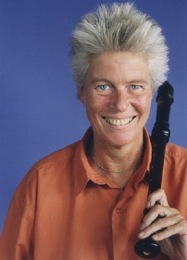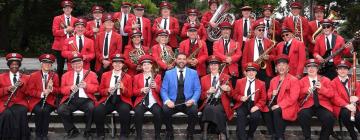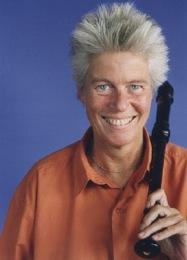
When Marion Verbruggen plays the recorder, those who only know the instrument from summer camp concerts discover its true range and beauty. She’s renowned for her virtuosity, technical prowess, and spirited style. She frequently visits the Bay Area, often performing with the Philharmonia Baroque Orchestra or leading workshops for the San Francisco Early Music Society. It’s the latter group that brings her back to the Bay Area just now; its Baroque Music Workshop, which offers master classes as well as concerts, runs June 26–July 2 at Sonoma State University in Rohnert Park.
You’re coming for the SFEMS Baroque Workshop. What do you find most enjoyable about this event?
This event in San Francisco is a very special one. It’s a wonderful combination of heavy-duty, wonderful amateurs and colleagues that are great musicians. Every year, we’re always a pickup band, as every year there are different teachers.
This year we’re focusing on Italian and Italian-inspired music. I love Italian music, so I’m excited, though I know we can’t do Italian music every year. But we can also include non-Italian composers in this [workshop], such as the German composers who lived in Italy for their careers.
What will you be performing?
Right now, we have too many pieces! We’ve been going back and forth. I’m leaving on Monday so I have to get everything together to bring. I’ll be doing a concerto of Vivaldi’s with violin, oboe, recorder, bassoon, organ (or harpsichord), and cello. I’ll also play a late 18th-century duet with Frances Blaker, as well as other pieces.
Featured Video
You come to the Bay Area fairly often. What do you enjoy here?
It’s a special place. It’s one of my favorites, along with the Amherst Early Music festival. There are such wonderful players and atmosphere. There’s a love for the music, and the public reaction is fantastic. The audiences are open and nice. They ask interesting questions after the concerts. And the weather is a little better than at home.
When I’m there, I try to spend a couple of extra days. We like to go hiking in Point Reyes, go to the national parks, and combine seeing friends with seeing museums and playing.
What drew you to the recorder?
In my family, you started at age 5 with musical training. After a year, you started on an instrument. We started with the recorder. I was the fourth of five children, so I already had brothers and sisters who played. I was fascinated by the recorder. When I was about 9, I started clarinet.
I was one of the lucky ones. I knew I wanted to be a musician. The recorder was my instrument, though I also got involved with Renaissance and Middle Ages instruments. It was perfect timing. Baroque music was blooming in Holland [where she was reared].
What are some of the misconceptions people have about the instrument?
Over time, those have changed. They no longer think it is a stupid thing only for children. It’s more grown-up, in the minds of people. They no longer ask, “Do you play a real instrument?” as much. I would play an ivory recorder, and people used to say that it was a nice color of plastic. It really has developed, and people realize that it has a fantastic sound and music.
You also play contemporary classical music. What is different about these works?
I use a different instrument, with a pitch of [A tuned to a frequency of] 440 or 442. The instrument has changed. There’s a big difference even between 17th-century and 18th-century instruments. Modern instruments and 18th-century instruments are very different. Most people who play Baroque music play copies of original 18th-century instruments. The pitch is 415.
I have many instruments. It depends on the piece and the style.
I was one of the lucky ones. I knew I wanted to be a musician. The recorder was my instrument ... It was perfect timing. Baroque music was blooming in Holland
What other instruments would you play?
I play the modern clarinet and the Mozart clarinet. I like playing Renaissance instruments. I love the cornetto. I’ve learned to play the gamba. It is interesting to learn what a bow can do. I like to play with a gamba quintet, but I’m a pretty mediocre amateur on that instrument.
I took five years of singing lessons. It’s good to sing.
What would you do if not a musician?
I would draw or paint or do photography. Or I’d be a swimmer.
What do you do in your spare time?
I do art and photography, and I still swim.
Not cycling and skating? That seems so “Netherlands.”
I used to skate and was good as a child, but I had to stop, with knee problems. When it’s good skating, the Netherlands is turned upside down.
Anything else?
We just got back from sailing. We got a sailing boat about four years ago. We went up to the upper part of the Netherlands. Between the islands and the mainland, you can put your anchor down about two hours before low tide, and then you’re there as the tide slowly goes down and you have about six hours out there by yourself, completely alone with the birds. We’ve also sailed in England and along the Belgian coast.
What are you listening to these days?
Not so much. I’m too busy. But I do listen to colleagues, and I get recordings from people I know and students, and I reply. I like opera; well, I like all sorts of things. I have broad musical tastes.
To learn more about the upcoming workshop, go to the SFEMS site here. Verbruggen will also return to the Bay Area in November with the Philharmonia Baroque Orchestra.

